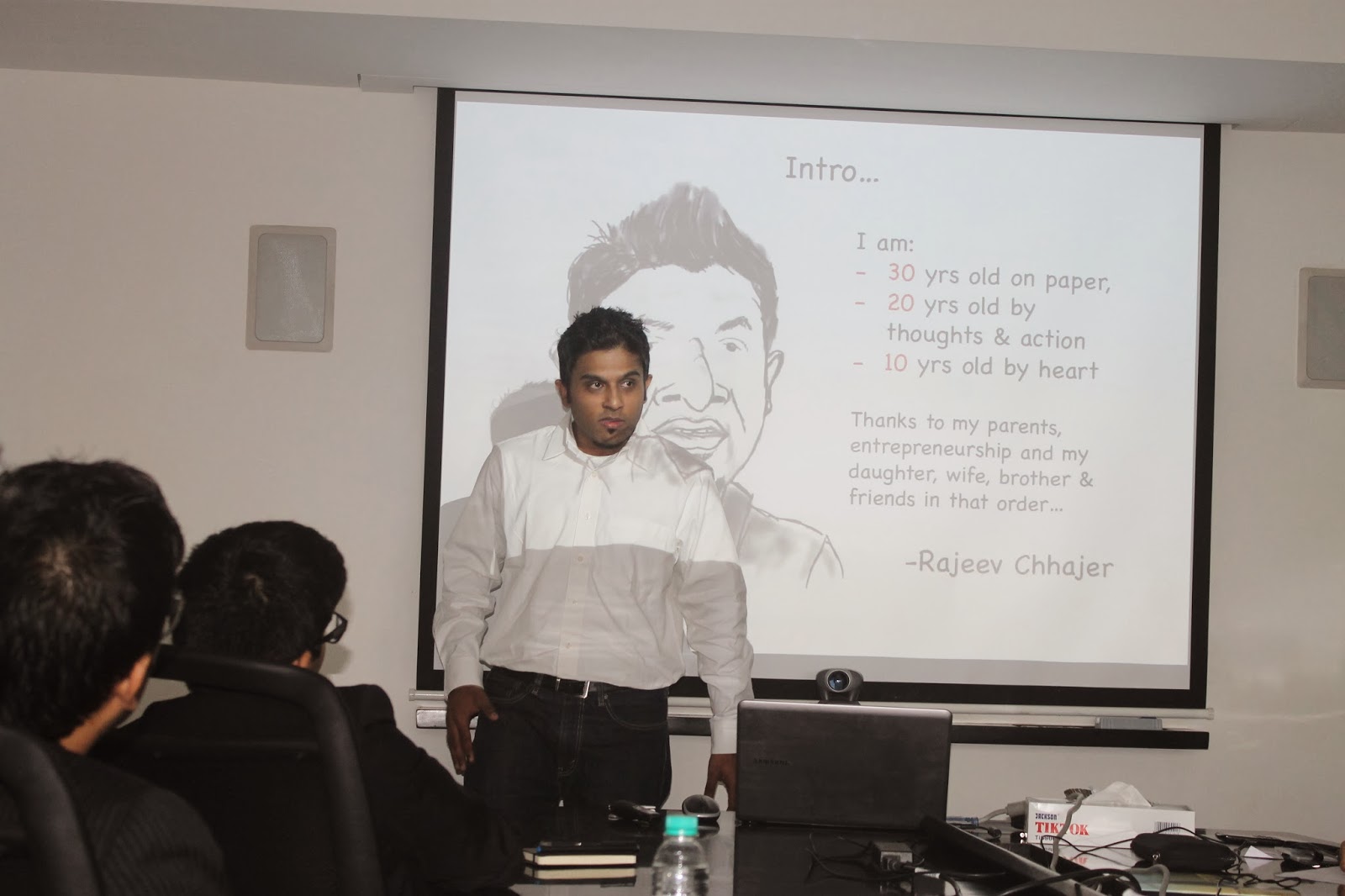It was a couple months back when I heard about the Startup Leadership Program (http://www.startupleadership.com). I read about it, found it interesting and started reading more about how I could enroll. To my surprise, there was a selection process. This in a way was a roadblock because I was in no mood to write essays. Anyway, I thought about it deeper and somewhere I felt like this program would help me take my startup to a very different level so I took a stab at the essays and the admission form. With the daily grind, somewhere I forgot that I had applied. Finally, out of the blue I got a call and coordinator told me I got selected! Yippiee!! :-) I was really excited about this community!
As I write this blog, I'm somewhere in the middle of the entire 6 month program. The program has been very enlightening, eye-opening and a great learning experience. I've met some amazing and enthusiastic budding entrepreneurs, successful entrepreneurs and investors. Every session has so much to take away. We've covered topics on business plans, pitches, financial modeling, customer development, valuations, products, investments, lean methods, sales, customer development and many more exciting topics to come as we move ahead.
I got to meet with some very exciting entrepreneurs, Nischal from JustUnfollow, Sampad from Instamojo, Pravin from Wishberg, Kunal from Freecharge, Vikram from MyDentist, Mohit from Carwale, Sameer from CouponDunia, Vikram from yavvy.com and Bijaei from Loyalty Rewardz.
But I'd like to share my learnings till date and how I have implemented it within Last-Bench! One of our biggest strengths as a startup is that we have a strong, dependable and multi-talented team. It might not be large but it is a team whose strengths are diverse and individually each member, using their unique talent, contributes to the business goals in a unified manner. One of our biggest weaknesses is the constant pivoting and loss of focus when trying to experiment with too many things.
As part of our lean method, the first thing we did was clearly identify the areas (product and services) we want to work on. We chose 1 product and 1 service that we wanted to focus on. This is helping us to be more focused and also allowing us to channel our energies in the right direction. Second, we've decided that each one manages his own time but wherever dependencies, that person is responsible to coordinate with the other people so that a bigger weekly goal is achieved. Third, we've started weekly targets that sum up to the bigger targets and everyone needs to report whether it is completed or not. There is no room to say that it is partially completed or 50-60% completed. If remaining, simply means it is not done. Fourth, we kept clear goals in terms of revenue and product development. Fifth, experimentation is key to find out whether a feature or a sales method will work for us or not. Sixth, there is no room for assumptions. Seventh and the most important, keep having fun while working!
Before and after every session I share the learnings with my team and everybody is excited to learn more. I personally think, a program like this, is definitely good for entrepreneurs who are in the 1st two years or to-be entrepreneurs. The biggest advantage that this program brings is the discipline!
Here are some pics from the sessions:
I will write more on this once the program ends and share my learning on each topic as we progress.
You can follow Rajeev on Twitter or connect with him via LinkedIn
As I write this blog, I'm somewhere in the middle of the entire 6 month program. The program has been very enlightening, eye-opening and a great learning experience. I've met some amazing and enthusiastic budding entrepreneurs, successful entrepreneurs and investors. Every session has so much to take away. We've covered topics on business plans, pitches, financial modeling, customer development, valuations, products, investments, lean methods, sales, customer development and many more exciting topics to come as we move ahead.
I got to meet with some very exciting entrepreneurs, Nischal from JustUnfollow, Sampad from Instamojo, Pravin from Wishberg, Kunal from Freecharge, Vikram from MyDentist, Mohit from Carwale, Sameer from CouponDunia, Vikram from yavvy.com and Bijaei from Loyalty Rewardz.
But I'd like to share my learnings till date and how I have implemented it within Last-Bench! One of our biggest strengths as a startup is that we have a strong, dependable and multi-talented team. It might not be large but it is a team whose strengths are diverse and individually each member, using their unique talent, contributes to the business goals in a unified manner. One of our biggest weaknesses is the constant pivoting and loss of focus when trying to experiment with too many things.
As part of our lean method, the first thing we did was clearly identify the areas (product and services) we want to work on. We chose 1 product and 1 service that we wanted to focus on. This is helping us to be more focused and also allowing us to channel our energies in the right direction. Second, we've decided that each one manages his own time but wherever dependencies, that person is responsible to coordinate with the other people so that a bigger weekly goal is achieved. Third, we've started weekly targets that sum up to the bigger targets and everyone needs to report whether it is completed or not. There is no room to say that it is partially completed or 50-60% completed. If remaining, simply means it is not done. Fourth, we kept clear goals in terms of revenue and product development. Fifth, experimentation is key to find out whether a feature or a sales method will work for us or not. Sixth, there is no room for assumptions. Seventh and the most important, keep having fun while working!
Before and after every session I share the learnings with my team and everybody is excited to learn more. I personally think, a program like this, is definitely good for entrepreneurs who are in the 1st two years or to-be entrepreneurs. The biggest advantage that this program brings is the discipline!
Here are some pics from the sessions:
I will write more on this once the program ends and share my learning on each topic as we progress.
You can follow Rajeev on Twitter or connect with him via LinkedIn






